Organizational Behavior: Theories, Job Satisfaction, and Motivation
VerifiedAdded on 2023/01/11
|6
|802
|35
Essay
AI Summary
This essay delves into the realm of organizational behavior, examining the intricate relationships between work expectations, job satisfaction, and employee motivation. It begins by exploring the expectancy theory, emphasizing how aligning organizational needs with individual rewards can mitigate job dissatisfaction and boost morale. The essay then transitions to McClelland's Learned Needs Theory and Self-Determination theory, highlighting the roles of achievement, affiliation, power, and psychological needs in driving employee behavior and fostering intrinsic motivation. Through a comparative analysis of these theories, the essay concludes that fulfilling psychological needs and providing motivational elements are essential for achieving job satisfaction, increasing work expectations, and enhancing overall efficiency within an organization. This ultimately reduces issues related to job dissatisfaction and promotes a more committed workforce.
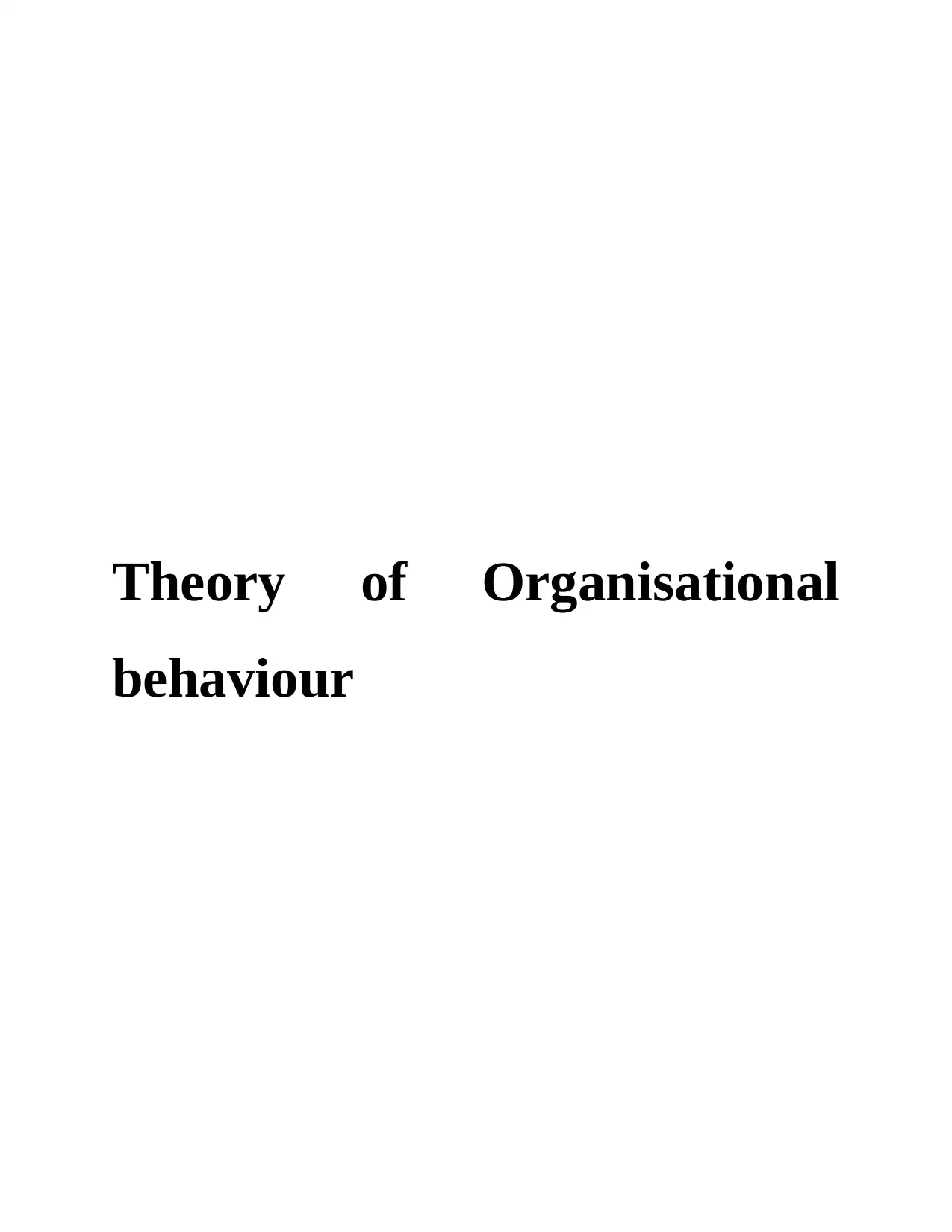
Theory of Organisational
behaviour
behaviour
Paraphrase This Document
Need a fresh take? Get an instant paraphrase of this document with our AI Paraphraser
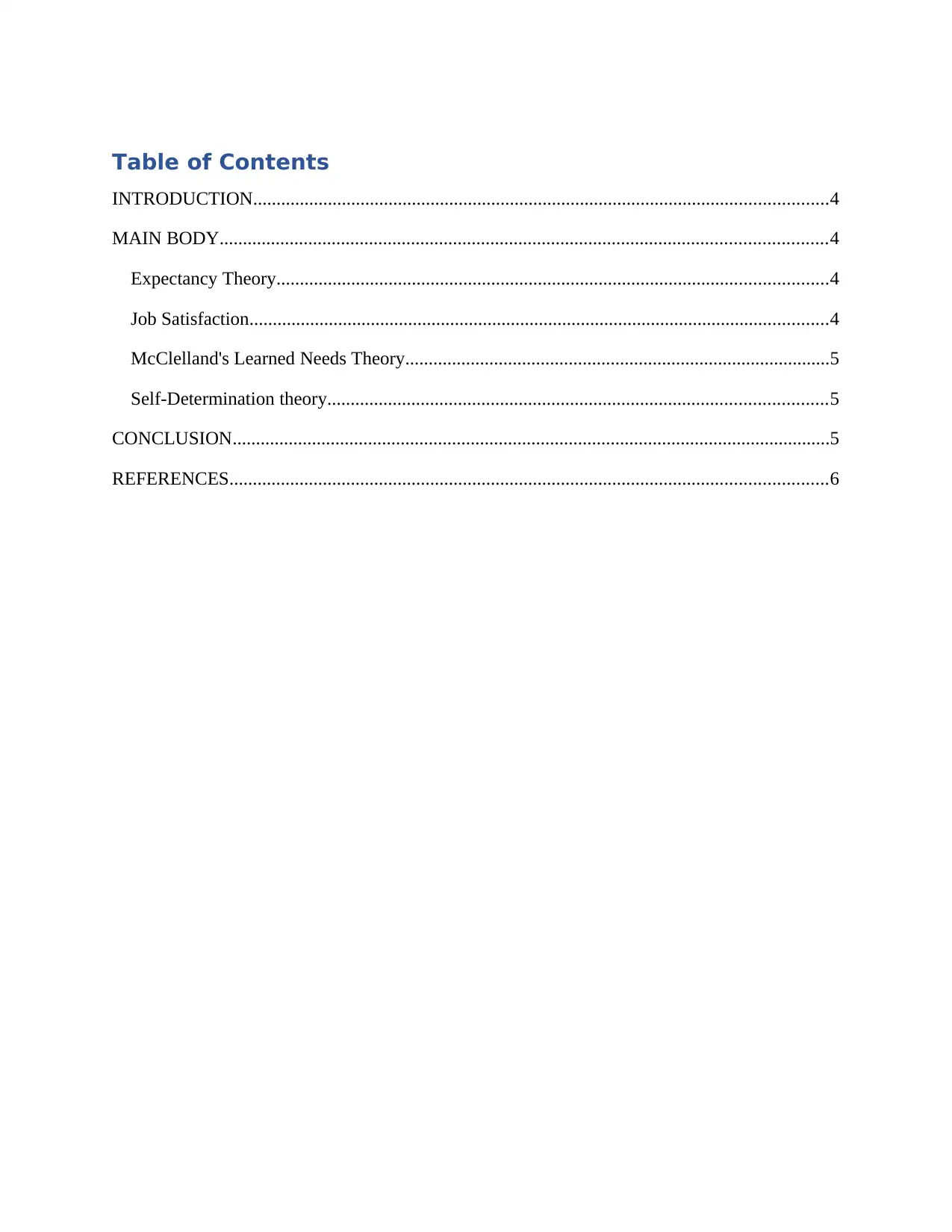
Table of Contents
INTRODUCTION...........................................................................................................................4
MAIN BODY..................................................................................................................................4
Expectancy Theory......................................................................................................................4
Job Satisfaction............................................................................................................................4
McClelland's Learned Needs Theory...........................................................................................5
Self-Determination theory...........................................................................................................5
CONCLUSION................................................................................................................................5
REFERENCES................................................................................................................................6
INTRODUCTION...........................................................................................................................4
MAIN BODY..................................................................................................................................4
Expectancy Theory......................................................................................................................4
Job Satisfaction............................................................................................................................4
McClelland's Learned Needs Theory...........................................................................................5
Self-Determination theory...........................................................................................................5
CONCLUSION................................................................................................................................5
REFERENCES................................................................................................................................6
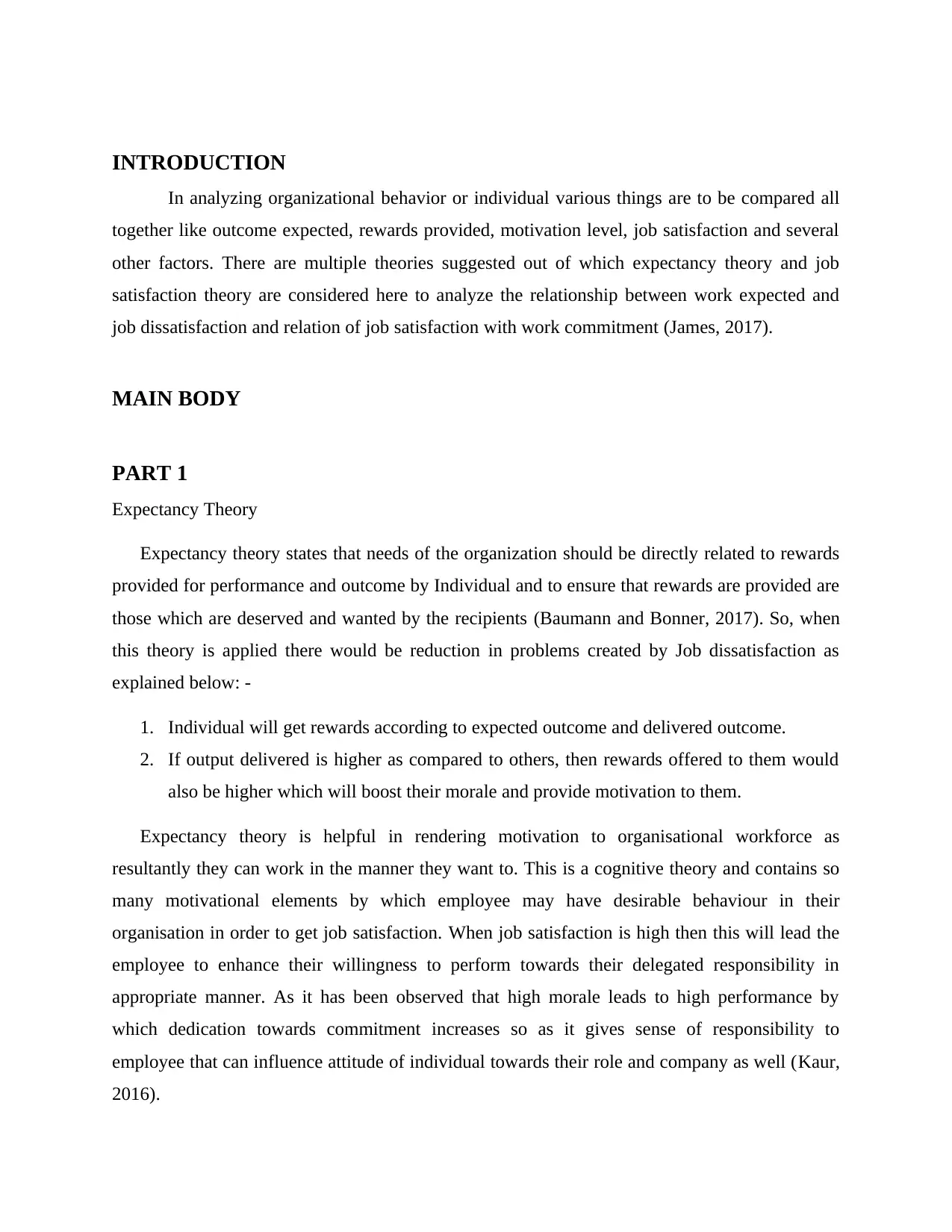
INTRODUCTION
In analyzing organizational behavior or individual various things are to be compared all
together like outcome expected, rewards provided, motivation level, job satisfaction and several
other factors. There are multiple theories suggested out of which expectancy theory and job
satisfaction theory are considered here to analyze the relationship between work expected and
job dissatisfaction and relation of job satisfaction with work commitment (James, 2017).
MAIN BODY
PART 1
Expectancy Theory
Expectancy theory states that needs of the organization should be directly related to rewards
provided for performance and outcome by Individual and to ensure that rewards are provided are
those which are deserved and wanted by the recipients (Baumann and Bonner, 2017). So, when
this theory is applied there would be reduction in problems created by Job dissatisfaction as
explained below: -
1. Individual will get rewards according to expected outcome and delivered outcome.
2. If output delivered is higher as compared to others, then rewards offered to them would
also be higher which will boost their morale and provide motivation to them.
Expectancy theory is helpful in rendering motivation to organisational workforce as
resultantly they can work in the manner they want to. This is a cognitive theory and contains so
many motivational elements by which employee may have desirable behaviour in their
organisation in order to get job satisfaction. When job satisfaction is high then this will lead the
employee to enhance their willingness to perform towards their delegated responsibility in
appropriate manner. As it has been observed that high morale leads to high performance by
which dedication towards commitment increases so as it gives sense of responsibility to
employee that can influence attitude of individual towards their role and company as well (Kaur,
2016).
In analyzing organizational behavior or individual various things are to be compared all
together like outcome expected, rewards provided, motivation level, job satisfaction and several
other factors. There are multiple theories suggested out of which expectancy theory and job
satisfaction theory are considered here to analyze the relationship between work expected and
job dissatisfaction and relation of job satisfaction with work commitment (James, 2017).
MAIN BODY
PART 1
Expectancy Theory
Expectancy theory states that needs of the organization should be directly related to rewards
provided for performance and outcome by Individual and to ensure that rewards are provided are
those which are deserved and wanted by the recipients (Baumann and Bonner, 2017). So, when
this theory is applied there would be reduction in problems created by Job dissatisfaction as
explained below: -
1. Individual will get rewards according to expected outcome and delivered outcome.
2. If output delivered is higher as compared to others, then rewards offered to them would
also be higher which will boost their morale and provide motivation to them.
Expectancy theory is helpful in rendering motivation to organisational workforce as
resultantly they can work in the manner they want to. This is a cognitive theory and contains so
many motivational elements by which employee may have desirable behaviour in their
organisation in order to get job satisfaction. When job satisfaction is high then this will lead the
employee to enhance their willingness to perform towards their delegated responsibility in
appropriate manner. As it has been observed that high morale leads to high performance by
which dedication towards commitment increases so as it gives sense of responsibility to
employee that can influence attitude of individual towards their role and company as well (Kaur,
2016).
⊘ This is a preview!⊘
Do you want full access?
Subscribe today to unlock all pages.

Trusted by 1+ million students worldwide

Paraphrase This Document
Need a fresh take? Get an instant paraphrase of this document with our AI Paraphraser
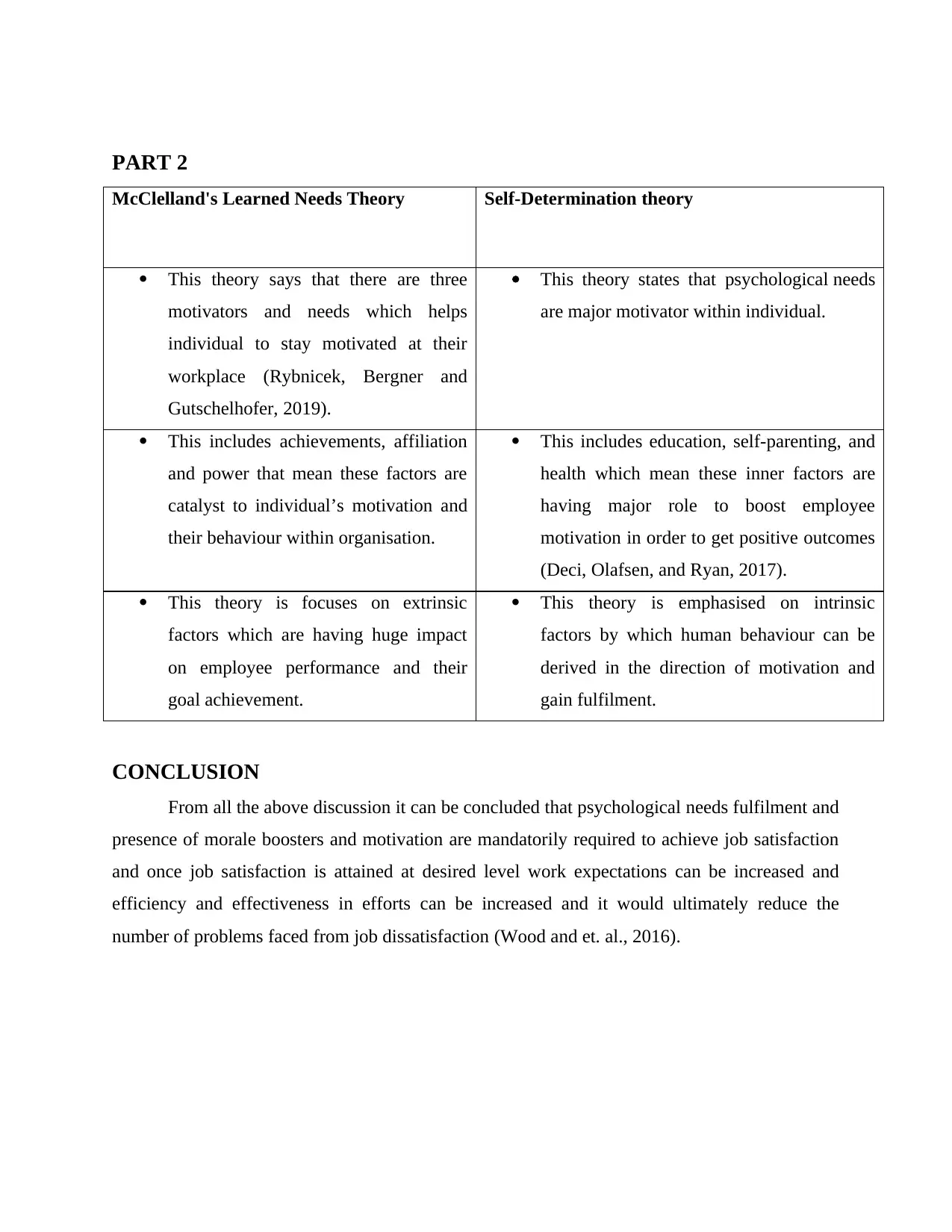
PART 2
McClelland's Learned Needs Theory Self-Determination theory
This theory says that there are three
motivators and needs which helps
individual to stay motivated at their
workplace (Rybnicek, Bergner and
Gutschelhofer, 2019).
This theory states that psychological needs
are major motivator within individual.
This includes achievements, affiliation
and power that mean these factors are
catalyst to individual’s motivation and
their behaviour within organisation.
This includes education, self-parenting, and
health which mean these inner factors are
having major role to boost employee
motivation in order to get positive outcomes
(Deci, Olafsen, and Ryan, 2017).
This theory is focuses on extrinsic
factors which are having huge impact
on employee performance and their
goal achievement.
This theory is emphasised on intrinsic
factors by which human behaviour can be
derived in the direction of motivation and
gain fulfilment.
CONCLUSION
From all the above discussion it can be concluded that psychological needs fulfilment and
presence of morale boosters and motivation are mandatorily required to achieve job satisfaction
and once job satisfaction is attained at desired level work expectations can be increased and
efficiency and effectiveness in efforts can be increased and it would ultimately reduce the
number of problems faced from job dissatisfaction (Wood and et. al., 2016).
McClelland's Learned Needs Theory Self-Determination theory
This theory says that there are three
motivators and needs which helps
individual to stay motivated at their
workplace (Rybnicek, Bergner and
Gutschelhofer, 2019).
This theory states that psychological needs
are major motivator within individual.
This includes achievements, affiliation
and power that mean these factors are
catalyst to individual’s motivation and
their behaviour within organisation.
This includes education, self-parenting, and
health which mean these inner factors are
having major role to boost employee
motivation in order to get positive outcomes
(Deci, Olafsen, and Ryan, 2017).
This theory is focuses on extrinsic
factors which are having huge impact
on employee performance and their
goal achievement.
This theory is emphasised on intrinsic
factors by which human behaviour can be
derived in the direction of motivation and
gain fulfilment.
CONCLUSION
From all the above discussion it can be concluded that psychological needs fulfilment and
presence of morale boosters and motivation are mandatorily required to achieve job satisfaction
and once job satisfaction is attained at desired level work expectations can be increased and
efficiency and effectiveness in efforts can be increased and it would ultimately reduce the
number of problems faced from job dissatisfaction (Wood and et. al., 2016).
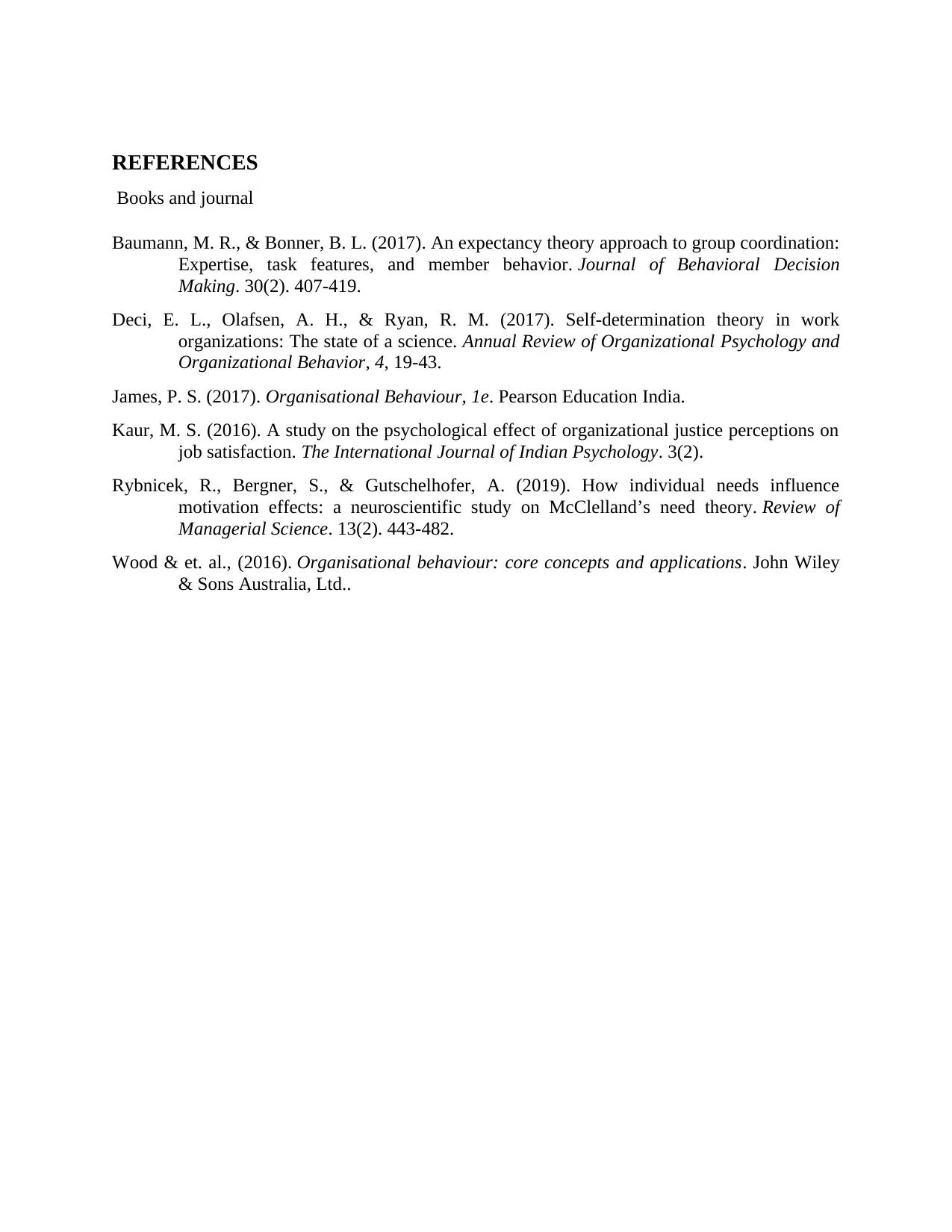
REFERENCES
Books and journal
Baumann, M. R., & Bonner, B. L. (2017). An expectancy theory approach to group coordination:
Expertise, task features, and member behavior. Journal of Behavioral Decision
Making. 30(2). 407-419.
Deci, E. L., Olafsen, A. H., & Ryan, R. M. (2017). Self-determination theory in work
organizations: The state of a science. Annual Review of Organizational Psychology and
Organizational Behavior, 4, 19-43.
James, P. S. (2017). Organisational Behaviour, 1e. Pearson Education India.
Kaur, M. S. (2016). A study on the psychological effect of organizational justice perceptions on
job satisfaction. The International Journal of Indian Psychology. 3(2).
Rybnicek, R., Bergner, S., & Gutschelhofer, A. (2019). How individual needs influence
motivation effects: a neuroscientific study on McClelland’s need theory. Review of
Managerial Science. 13(2). 443-482.
Wood & et. al., (2016). Organisational behaviour: core concepts and applications. John Wiley
& Sons Australia, Ltd..
Books and journal
Baumann, M. R., & Bonner, B. L. (2017). An expectancy theory approach to group coordination:
Expertise, task features, and member behavior. Journal of Behavioral Decision
Making. 30(2). 407-419.
Deci, E. L., Olafsen, A. H., & Ryan, R. M. (2017). Self-determination theory in work
organizations: The state of a science. Annual Review of Organizational Psychology and
Organizational Behavior, 4, 19-43.
James, P. S. (2017). Organisational Behaviour, 1e. Pearson Education India.
Kaur, M. S. (2016). A study on the psychological effect of organizational justice perceptions on
job satisfaction. The International Journal of Indian Psychology. 3(2).
Rybnicek, R., Bergner, S., & Gutschelhofer, A. (2019). How individual needs influence
motivation effects: a neuroscientific study on McClelland’s need theory. Review of
Managerial Science. 13(2). 443-482.
Wood & et. al., (2016). Organisational behaviour: core concepts and applications. John Wiley
& Sons Australia, Ltd..
⊘ This is a preview!⊘
Do you want full access?
Subscribe today to unlock all pages.

Trusted by 1+ million students worldwide
1 out of 6
Related Documents
Your All-in-One AI-Powered Toolkit for Academic Success.
+13062052269
info@desklib.com
Available 24*7 on WhatsApp / Email
![[object Object]](/_next/static/media/star-bottom.7253800d.svg)
Unlock your academic potential
Copyright © 2020–2026 A2Z Services. All Rights Reserved. Developed and managed by ZUCOL.




